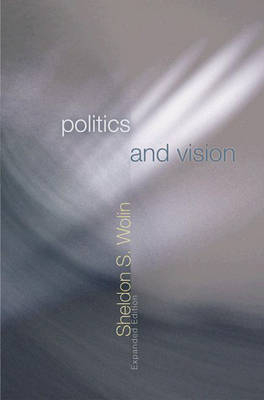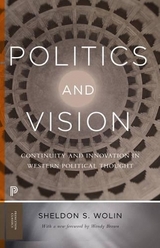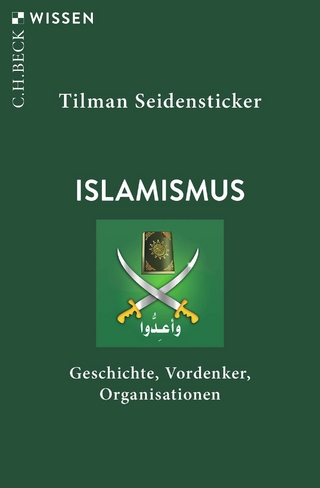
Politics and Vision
Princeton University Press (Verlag)
978-0-691-11977-9 (ISBN)
- Titel erscheint in neuer Auflage
- Artikel merken
Wolin shows that great theorists have been driven to shape politics to some vision of the Good that lies outside the existing political order. As he tells it, the history of theory is thus, in part, the story of changing assumptions about the Good. In the new chapters, Wolin displays all the energy and flair, the command of detail and of grand historical developments, that he brought to this story forty years ago. This is a work of immense talent and intense thought, an intellectual achievement that will endure.
Sheldon S. Wolin is Professor of Politics Emeritus at Princeton University. He taught political theory for forty years at Oberlin College, the Universities of California, Berkeley, Santa Cruz, and Los Angeles, Princeton University, Cornell University, and Oxford University. He was the founding editor of the journal "democracy". The first edition of "Politics and Vision" received the American Political Science Association's Benjamin E. Lippincott Award. Wolin's other books include "Tocqueville between Two Worlds" (Princeton) and "The Presence of the Past".
Preface to the Expanded Edition xv Preface xxiii PART ONE Chapter One: Political Philosophy and Philosophy 3 I Political Philosophy as a Form of Inquiry 3 II Form and Substance 4 III Political Thought and Political Institutions 7 IV Political Philosophy and the Political 9 V The Vocabulary of Political Philosophy 12 VI Vision and Political Imagination 17 VII Political Concepts and Political Phenomena 20 VIII A Tradition of Discourse 21 IX Tradition and Innovation 23 Chapter Two: Plato: Political Philosophy versus Politics 27 I The Invention of Political Philosophy 27 II Philosophy and Society 32 III Politics and Architectonics 37 IV The Search for a Selfless Instrument 47 V The Question of Power 51 VI Political Knowledge and Political Participation 54 VII The Limits of Unity 58 VIII The Ambiguities of Plato 61 Chapter Three: The Age of Empire: Space and Community 63 I The Crisis in the Political 63 II The New Dimensions of Space 65 III Citizenship and Disengagement 70 IV Politics and the Roman Republic 75 V The Politics of Interest 79 VI From Political Association to Power Organization 82 VII The Decline of Political Philosophy 85 Chapter Four: The Early Christian Era: Time and Community 86 I The Political Element in Early Christianity: The New Notion of Community 86 II The Church as a Polity: The Challenge to the Political Order 95 III Politics and Power in a Church-Society 103 IV The Embarrassments of a Politicized Religion and the Task of Augustine 108 V The Identity of the Church-Society Reasserted: Time and Destiny 111 VI Political Society and Church-Society 115 VII The Language of Religion and the Language of Politics: Footnote on Mediaeval Christian Thought 118 Chapter Five: Luther: The Theological and the Political 127 I Political Theology 127 II The Political Element in Luther's Thought 128 III The Bias against Institutions 136 IV The Status of the Political Order 139 V The Political Order without Counterweight 143 VI The Fruits of Simplicity 145 Chapter Six: Calvin: The Political Education of Protestantism 148 I The Crisis in Order and Civility 148 II The Political Quality of Calvin's Thought 151 III The Political Theory of Church Government 158 IV The Restoration of the Political Order 160 V Political Knowledge 164 VI Political Office 166 VII Power and Community 170 Chapter Seven: Machiavelli: Politics and the Economy of Violence 175 I The Autonomy of Political Theory 175 II The Commitments of the Political Theorist 182 III The Nature of Politics and the Categories of the New Science 187 IV Political Space and Political Action 195 V The Economy of Violence 197 VI Ethics: Political and Private 200 VII The Discovery of the Mass 205 VIII Politics and Souls 211 Chapter Eight: Hobbes: Political Society as a System of Rules 214 I The Revival of Political Creativity 214 II Political Philosophy and the Revolution in Science 218 III The Promise of Political Philosophy 222 IV The Language of Politics: The Problem of Constituency 230 V Political Entropy: The State of Nature 235 VI The Sovereign Definer 238 VII Power without Community 243 VIII Interests and Representation 248 IX Politics as a Field of Forces 252 Chapter Nine: Liberalism and the Decline of Political Philosophy 257 I The Political and the Social 257 II Liberalism and the Sobrieties of Philosophy 263 III The Political Claims of Economic Theory 268 IV The Eclipse of Political Authority: The Discovery of Society 273 V Society and Government: Spontaneity versus Coercion 277 VI Liberalism and Anxiety 282 VII Beyond the Pleasure Principle: The Problem of Pain 292 VIII Liberalism and Moral Judgments: The Substitution of Interest for Conscience 297 IX Liberalism and Conformity: The Socialized Conscience 307 Chapter Ten: The Age of Organization and the Sublimation of Politics 315 I The Age of Organization 315 II Identifying a Tradition of Discourse 319 III Organization and Community 325 IV Rousseau: The Idea of Community 330 V Freedom and Impersonal Dependence 334 VI Saint-Simon: The Idea of Organization 336 VII Organization Theory and Methodology: Some Parallels 342 VIII Organization, Method, and Constitutional Theory 348 IX Communal Values in Organization 352 X The Attack on Economic Rationalism 360 XI Organization Theory: Rationalism versus Organicism 364 XII The Attack on the Political 371 XIII Elite and Mass: Action in the Age of Organization 376 XIV Concluding Remarks 384 PART TWO Chapter Eleven: From Modern to Postmodern Power 393 I Celebrating the Death of the Past 393 II The Baconian Vision of Power 395 III Cultivating Mind and Method 397 IV Modern Power Realized 399 V Modern Power and Its Constituent Elements 400 VI Containing Power 402 Chapter Twelve: Marx: Theorist of the Political Economy of the Proletariat or of Uncollapsed Capitalism? 406 I Marx and Nietzsche: Economy or Culture? 406 II Marx and the Theoretical Vocation 407 III Marx and the Idea of a Political Economy 410 IV Working through the Idea of Democracy 412 V The Power of Theory 415 VI The Politics of Economy: The 1844 Manuscripts 416 VII The Historical Origins of Power 420 VIII Power, Force, and Violence 423 IX Modern Power Revealed 425 X Marx and Locke: Parallel Narratives 427 XI The Alienation of Power 430 XII The Worker as Political Actor 432 XIII Capitalism and the Political Shaping of the Working Class 435 XIV Capital: Contradiction and Crisis 436 XV Inheriting the Power-System of Capital 438 XVI The Status of Politics 439 XVII The Question of Dictatorship 440 XVIII The Paris Commune 445 XIX Anticipating the End of Politics 448 XX Defending a Post-politics 450 XXI Underestimating the Capitalist 452 Chapter Thirteen: Nietzsche: Pretotalitarian, Postmodern 454 I From Economy to Culture 454 II "Some are born posthumously" 456 III The New Nietzsche 457 IV Totalitarianism as a Form 458 V Nietzsche: A Political Theorist? 460 VI The Theorist as Immoralist 462 VII The Politics of Critical Totalitarianism 464 VIII The Extraordinary versus the Normal 467 IX The Totalitarian Dynamic 468 X The Extermination of Decadence 471 XI Cultural Wars 472 XII The Crisis of Nihilism 474 XIII The Aesthete and the Herd 475 XIV The Politics of Culture 477 XV A New Elite 479 XVI The Theorist of Anti-theory 481 XVII Rediscovering Myth 484 XVIII The Making of the Herd 485 XIX Myth and Theory 486 XX Looking for a New Dionysius 489 XXI Nietzsche as Political Analyst 490 XXII The Will-to-Power in the Twentieth Century 492 Chapter Fourteen: Liberalism and the Politics of Rationalism 495 I Popper, Dewey, and Rawls: Playing Out Liberalism 495 II The Closed Society 496 III The Open Society 500 IV Hints of an Emerging Ambiguity 502 V Dewey: The Philosopher as Political Theorist 503 VI Bacon Redivivus 504 VII Educating for Power 506 VIII Democracy's Means: Education 507 IX Democracy and Economy 508 X The Contest over Science 510 XI The Idea of a Public 511 XII Great Society and Great Community 513 XIII The Scientific Community as Model Democracy 514 XIV The Fading Aura of Science 518 XV Totalitarianism and Technology 519 XVI Totalitarianism and the Reaction against Democracy 520 XVII Democratic Revival? 522 Chapter Fifteen: Liberal Justice and Political Democracy 524 I Liberalism on the Defensive 524 II Freedom and Equality: Liberal Dilemma 525 III John Rawls and the Revival of Political Philosophy 529 IV Economy and Political Economy 530 V Justice and Inequality 531 VI The "Original Position" and the Tradition of Contract Theory 536 VII Liberalism and Its Political 538 VIII Rawls's Genealogy of Liberalism 540 IX The Reasonableness of Liberalism 542 X The Threat of Comprehensive Doctrines 545 XI Liberal Political Culture 547 XII Liberalism and Governance 551 XIII Neo-liberalism in the Cold War 551 Chapter Sixteen: Power and Forms 557 I Old and New Political Forms 557 II Superpower and Terror 559 III Modern and Postmodern Power 562 IV Political Economy: The New Public Philosophy 563 V Collapsed Communism and Uncollapsed Capitalism 565 VI Political Economy and Postmodernism 566 VII The Political and Its Absent Carrier 567 VIII The Demythologizing of Science 568 IX Rational Political Science 570 X Political Science and the Political Establishment 574 XI The Odyssey of the State: From Welfare to Superpower 575 XII Faltering Vision 578 XIII Towards Totality 579 Chapter Seventeen: Postmodern Democracy: Virtual or Fugitive? 581 I Postmodern Culture and Postmodern Power 581 II Nietzschean Pessimism Transformed 582 III The Self as Microcosm 584 IV Centrifugals and Centripetals 585 V Centripetal Power 587 VI The Political Evolution of the Corporation 587 VII Empire and the Imperial Citizen 590 VIII Superpower and Inverted Totalitarianism 594 IX The Limits of Superpower? 594 X A Land of Political Opportunity 595 XI Capital and Democracy 596 XII Democracy at Bay 598 XIII Postrepresentative Politics 599 XIV Fugitive Democracy 601 Notes 607 Index 741
| Verlagsort | New Jersey |
|---|---|
| Sprache | englisch |
| Maße | 152 x 235 mm |
| Gewicht | 936 g |
| Themenwelt | Sozialwissenschaften ► Politik / Verwaltung ► Politische Theorie |
| ISBN-10 | 0-691-11977-5 / 0691119775 |
| ISBN-13 | 978-0-691-11977-9 / 9780691119779 |
| Zustand | Neuware |
| Haben Sie eine Frage zum Produkt? |
aus dem Bereich



